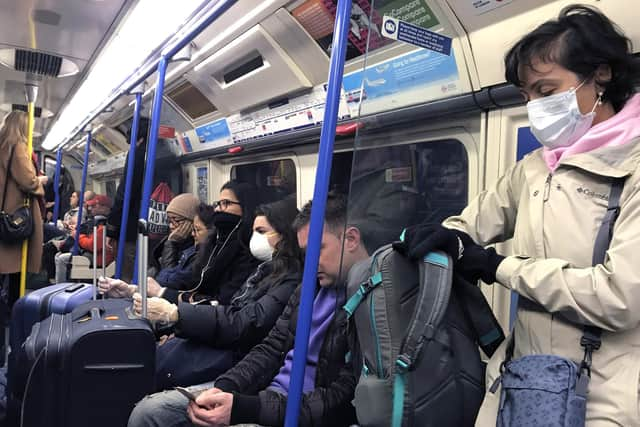Coronavirus: How to get tested for Covid-19 in the UK
and live on Freeview channel 276
If you are worried about whether you have coronavirus or not – these are the symptoms to watch out for.
Here’s what you need to know about being tested for Covid-19:
Can I get tested if I think I have coronavirus?


Advertisement
Hide AdAdvertisement
Hide AdOn its website the NHS says that tests for coronavirus are only done if there's a high chance you could have the illness.
In these cases, you can use the NHS 111 online coronavirus service to find out what to do.
However it has been announced that the NHS in England is ‘ramping up’ testing facilities so that 10,000 coronavirus tests can be performed each day.
Is there another type of test?
The government has ordered millions of antibody tests which will be able to tell if a person has had coronavirus.
What if you have symptoms of coronavirus?
Advertisement
Hide AdAdvertisement
Hide AdIf you have symptoms of coronavirus, you'll need to stay at home for 7 days.
After 7 days:
if you do not have a high temperature, you do not need to stay at home
if you still have a high temperature, stay at home until your temperature returns to normal
You do not need to stay at home if you just have a cough after 7 days. A cough can last for several weeks after the infection has gone.
How to stop infection spreading?
Advertisement
Hide AdAdvertisement
Hide AdThere are things you can do to help reduce the risk of you and anyone you live with getting ill with coronavirus.
Do
- wash your hands with soap and water often – do this for at least 20 seconds
- use hand sanitiser gel if soap and water are not available
- wash your hands as soon as you get back home
- cover your mouth and nose with a tissue or your sleeve (not your hands) when you cough or sneeze
Advertisement
Hide AdAdvertisement
Hide Ad- put used tissues in the bin immediately and wash your hands afterwards
Don't
- do not touch your eyes, nose or mouth if your hands are not clean
What should you do if someone you live with has symptoms ?
If you live with someone who has symptoms, you'll need to stay at home for 14 days from the day their symptoms started. This is because it can take 14 days for symptoms to appear.
If more than 1 person at home has symptoms, stay at home for 14 days from the day the first person started having symptoms.
Advertisement
Hide AdAdvertisement
Hide AdIf you get symptoms, stay at home for 7 days from when your symptoms start, even if it means you're at home for longer than 14 days.
If you do not get symptoms, you can stop staying at home after 14 days.
Should I stay indoors?
Everyone must stay at home to help stop the spread of coronavirus.
You should only leave the house for 1 of 4 reasons:
- shopping for basic necessities, for example food and medicine, which must be as infrequent as possible
Advertisement
Hide AdAdvertisement
Hide Ad- one form of exercise a day, for example a run, walk, or cycle – alone or with members of your household
- any medical need, or to provide care or to help a vulnerable person
- travelling to and from work, but only where this absolutely cannot be done from home
These 4 reasons are exceptions – even when doing these activities, you should be minimising time spent outside of the home and ensuring you are 2 metres apart from anyone outside of your household.
Advertisement
Hide AdAdvertisement
Hide AdIs there a vaccine for coronavirus?
There is currently no vaccine for Covid-19.
The virus is so new and different that it needs its own vaccine.
Simple hygiene measures like washing your hands with soap and water often, and avoiding people who are unwell, can help stop viruses like coronavirus spreading.
Comment Guidelines
National World encourages reader discussion on our stories. User feedback, insights and back-and-forth exchanges add a rich layer of context to reporting. Please review our Community Guidelines before commenting.
